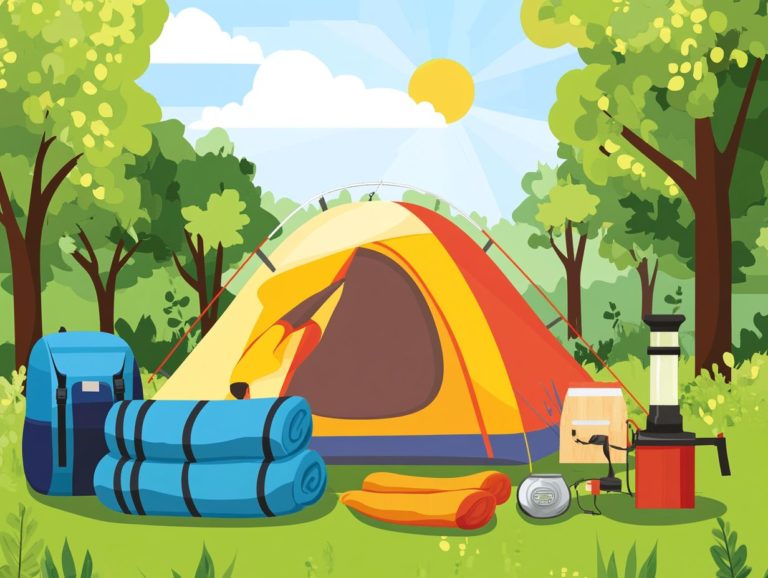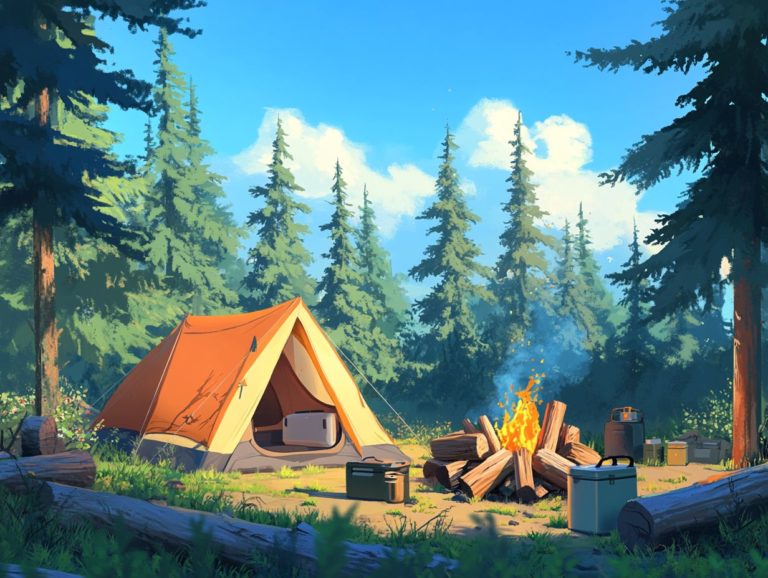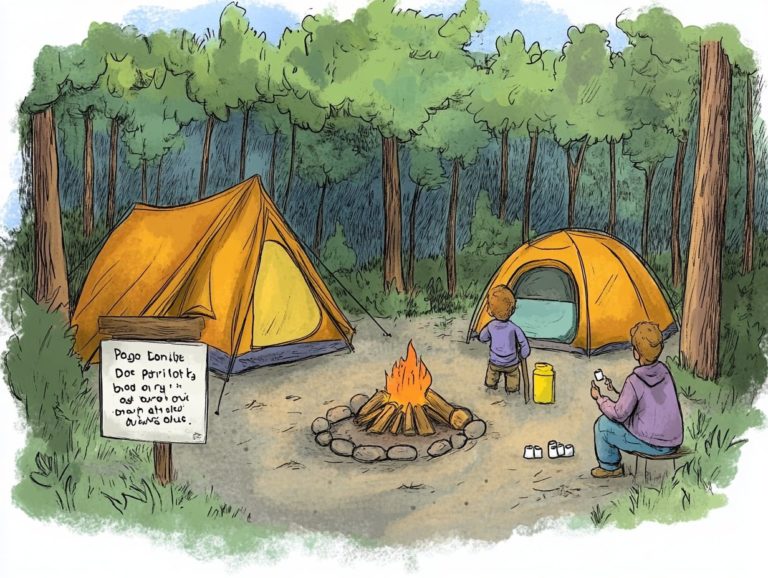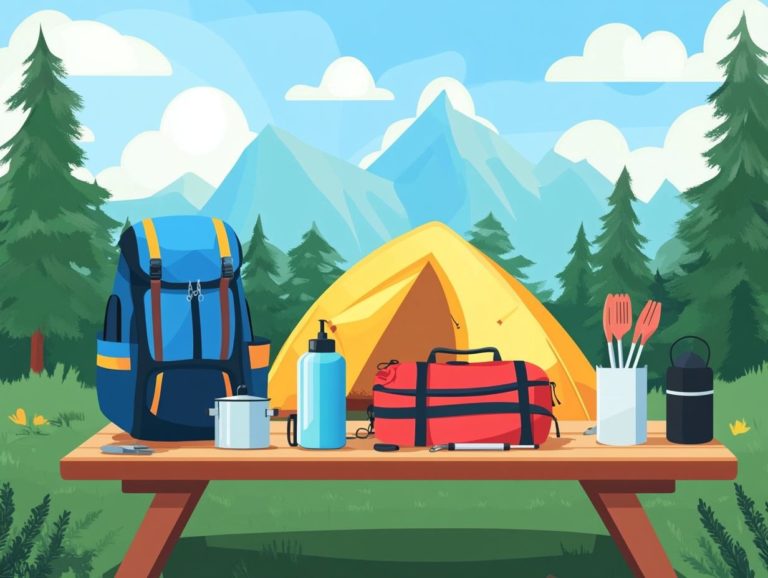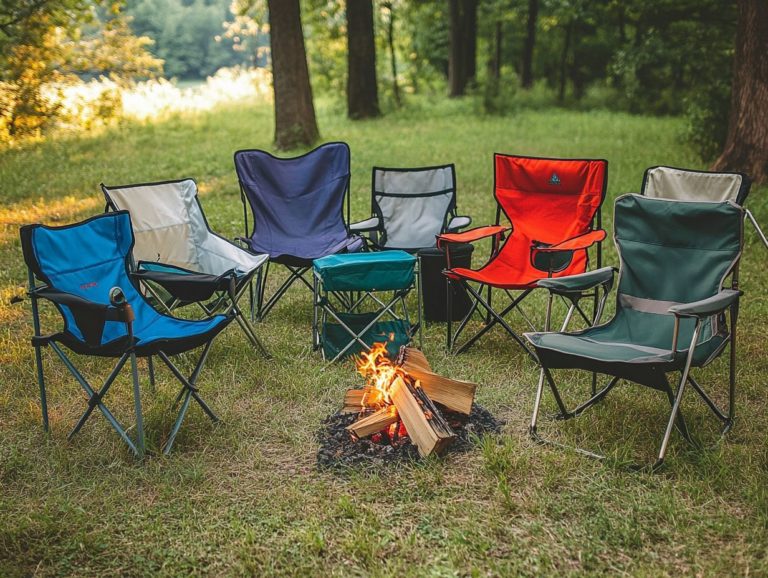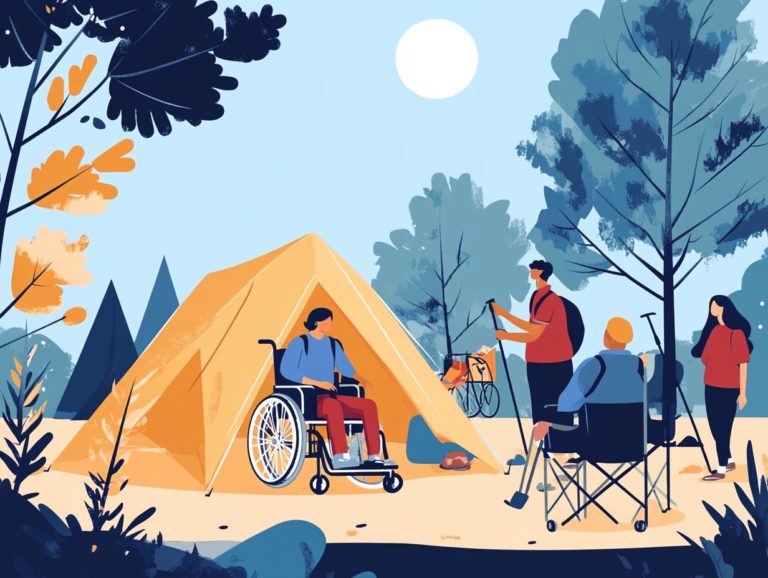How to Stay Hydrated While Camping
Staying hydrated is key to enjoying your camping experience. As you immerse yourself in the beauty of nature, the risks of dehydration may catch you off guard, especially if you re not mindful of your water intake and the potential dangers posed by contaminated water.
This article explores the importance of hydration while camping. You ll understand the dangers of dehydration and learn how to identify safe water sources. You ll also find practical tips for staying hydrated, recognizing the warning signs of dehydration, and preparing effectively for your next outdoor adventure.
Whether you re an experienced camper or new to outdoor activities like hiking, keeping hydrated is essential for truly savoring your time in the great outdoors.
Contents
- Key Takeaways:
- The Importance of Hydration While Camping
- Water Sources While Camping
- Hydration Tips for Camping
- Dehydration Warning Signs
- Preparing for a Hydrated Camping Trip
- Frequently Asked Questions
- What s the best way to stay hydrated while camping?
- What are some tips for staying hydrated in hot weather while camping?
- Are there any foods that can help me stay hydrated while camping?
- What are some signs of dehydration that I should watch out for while camping?
- How can I make sure I am staying properly hydrated while hiking or doing other physical activities while camping?
- What should I do if I run out of water while camping?
Key Takeaways:
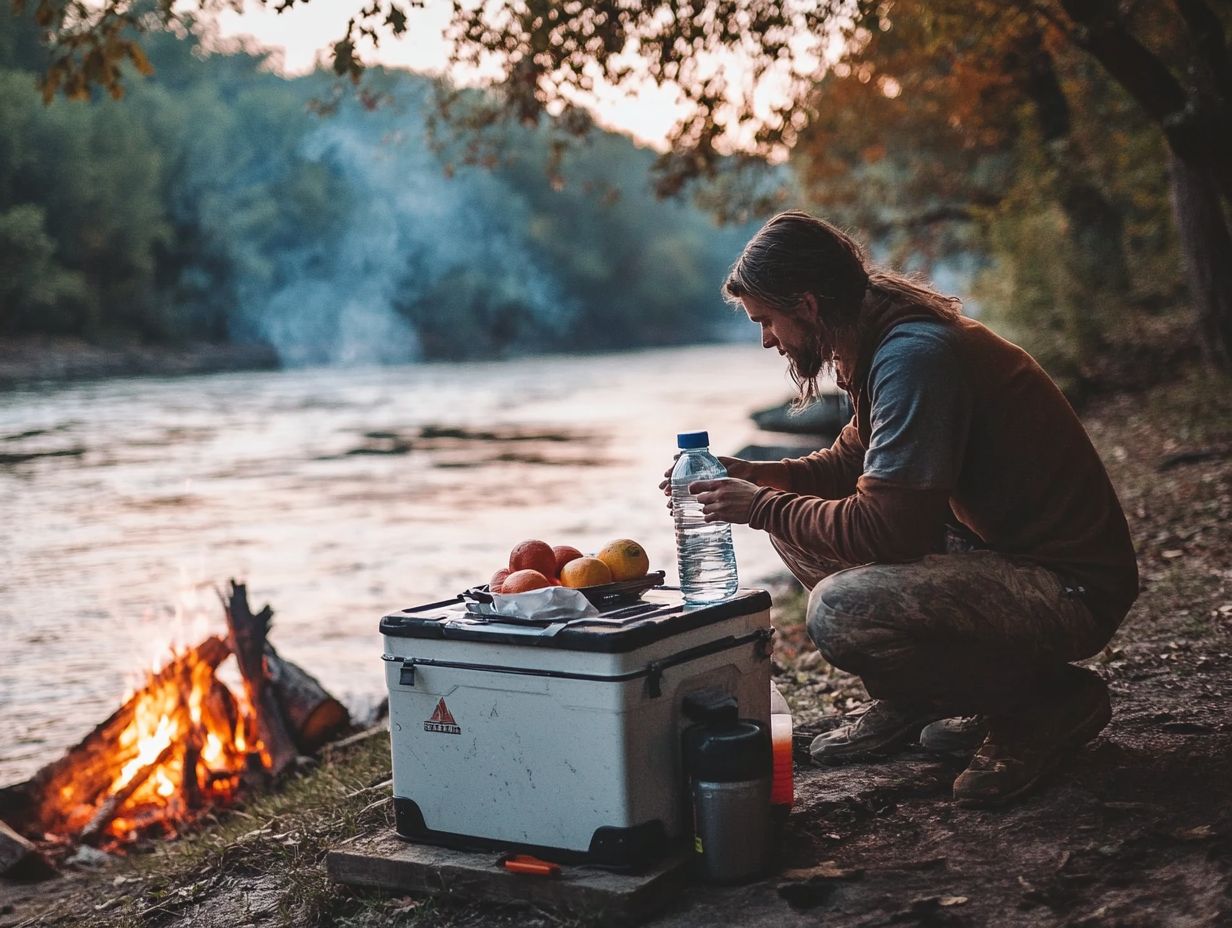
- Stay hydrated while camping to avoid health risks like dehydration and waterborne illnesses, and enjoy your outdoor experience to the fullest.
- Identify safe and reliable water sources, such as natural springs, filtration systems, and bringing your own water supply.
- Strategies for staying hydrated include drinking water regularly, avoiding excessive caffeine and alcohol, and incorporating hydrating snacks into your meals.
The Importance of Hydration While Camping
Hydration plays a pivotal role in ensuring your camping trip is enjoyable. It influences your physical activities, overall well-being, and appreciation of nature’s beauty.
Whether you’re tackling a challenging hike or unwinding by the campfire, recognizing the importance of proper hydration is vital. For tips on staying hydrated, check out how to stay hydrated while hiking. Neglecting your water intake could lead to dehydration, which presents serious health risks, especially in remote areas where safe drinking water may be hard to find.
You must prioritize hydration by monitoring your water intake and including electrolytes, which help maintain your body’s balance. This will keep you energized and healthy throughout your outdoor adventures.
Understanding the Risks of Dehydration in the Outdoors
Dehydration poses serious risks for campers; inadequate hydration can lead to dizziness, fatigue, and even heatstroke.
Understanding the significance of staying hydrated is crucial when engaging in outdoor activities that require physical stamina and mental sharpness. The body s hydration needs can vary with changing weather conditions, making it essential for outdoor enthusiasts to keep a close eye on their water intake.
Neglecting hydration not only threatens immediate comfort but also increases the risk of health issues like kidney stones or urinary infections. Remember to drink water regularly, adjusting your intake based on temperature, exertion level, and your overall hydration needs. For tips on how to stay hydrated while hiking, staying vigilant about hydration can make all the difference in ensuring a safe and enjoyable experience in the great outdoors.
Water Sources While Camping
Finding safe water sources is vital for staying hydrated. This includes bottled water and water from filtration systems, which are essential for maintaining your health during outdoor excursions.
Whether you re in a forest or camped by a river, understanding the quality of available water can significantly impact your ability to prevent waterborne illnesses caused by bacteria, viruses, and parasites.
Mastering techniques to treat potentially contaminated water such as boiling, using filtration systems, or applying chemical disinfectants can enhance your outdoor survival skills and ensure you remain safely hydrated throughout your adventure.
Plan ahead and make hydration your top priority for your next adventure!
Identifying Safe and Reliable Water Sources
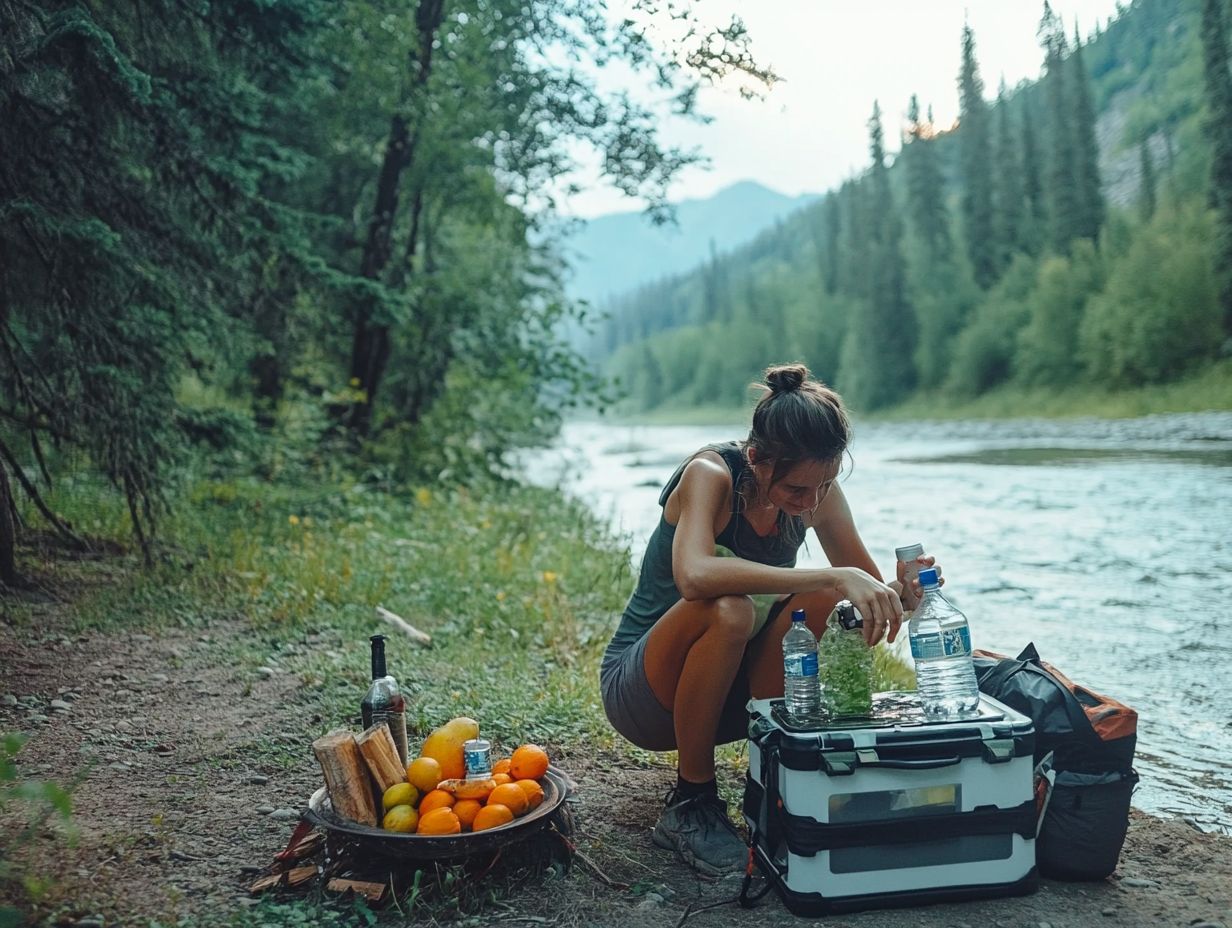
Finding safe water is crucial for every camper. Not every natural body of water offers safe drinking options free from contaminants like harmful germs in the water, bacteria, viruses, and potential chemical disinfectants.
When evaluating rivers, lakes, and streams, consider several factors, including the water s clarity, its smell, and its proximity to human activity or livestock. These can increase contamination risks. Observing the surrounding environment can provide vital clues. Stagnant or murky water often harbors harmful microorganisms, while flowing streams are generally safer, especially if they are upstream from potential pollution sources.
By employing outdoor survival techniques like boiling water or using filters, you can significantly reduce the risks associated with drinking unsafe water. Understanding the characteristics of safe drinking water like its clear appearance and absence of unusual odors will help you maintain your health and well-being on your outdoor adventures.
Hydration Tips for Camping
To ensure you maintain optimal hydration during your camping trips, you must have good ways to stay hydrated. This means consistently taking in water, utilizing hydration packs, and replenishing lost electrolytes from your physical activities.
Prioritizing hydration packs, portable water filters, and having access to clean drinking water should be at the forefront of your planning. This will help you stay energized and ward off fatigue.
Understanding your daily water needs and recognizing the signs of dehydration can significantly elevate your outdoor experience. You’ll feel your absolute best!
Strategies for Staying Hydrated in the Wilderness
Implementing effective hydration strategies while camping is essential for ensuring you remain adequately hydrated, especially in the wilderness where water access can be limited and water quality can vary.
Explore different ways to collect and treat water, like using nearby streams or lakes. Carrying portable water filters can greatly enhance the safety of your drinking water, making it a crucial addition to your gear.
Establishing a routine to drink water regularly even when you’re not feeling thirsty can help maintain optimal hydration levels. In unfamiliar terrains, boiling water stands out as a simple yet effective way to eliminate pathogens. This ensures that every sip you take supports your well-being.
By embracing these hydration techniques, you can mitigate the risks associated with dehydration, including heat exhaustion and waterborne illnesses. Fully immerse yourself in the adventure of the great outdoors!
Dehydration Warning Signs
Spotting the signs of dehydration can save your camping trip! Early detection can significantly reduce the risk of serious health issues linked to inadequate hydration.
Symptoms can manifest in various ways, starting from a simple thirst and dry mouth to more alarming signs like dizziness, confusion, and a noticeable decrease in urine output. Being aware of your hydration needs and taking a proactive approach to drinking water is essential for ensuring your well-being during outdoor adventures.
Stay hydrated and enjoy every moment of your outdoor adventure!
Recognizing and Addressing Symptoms
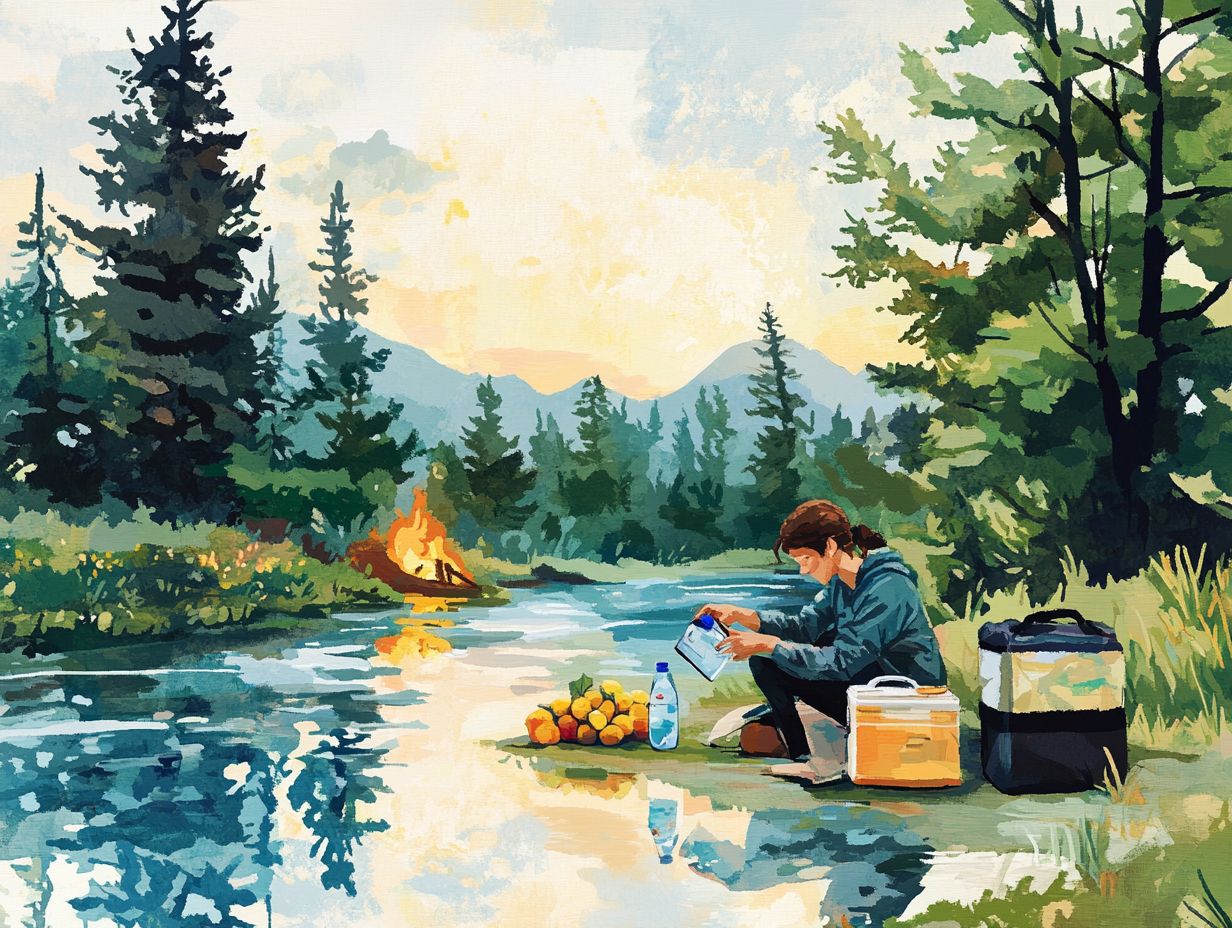
Spotting dehydration symptoms early can change your camping experience. Don t let health risks like heat exhaustion ruin your fun!
Dehydration can show up as a dry mouth, fatigue, dizziness, or dark-colored urine. These signals mean your body urgently needs hydration. When symptoms arise, take immediate action by sipping water gradually rather than gulping large amounts at once.
Replenishing electrolytes is crucial. Incorporating salty drinks or tablets can help restore the balance of sodium, potassium, and magnesium lost during physical activities. Prioritizing hydration and being aware of these signs will help you stay safe and enjoy your outdoor experiences to the fullest.
Preparing for a Hydrated Camping Trip
Preparing for a hydrated camping trip requires careful planning and the right gear. Ensure you have access to clean drinking water with portable water filters or hydration packs during your outdoor adventures.
Hydration packs are fantastic for carrying enough water while keeping your hands free for navigation or climbing. These backpacks hold water and have a straw for easy drinking. Portable water filters are also invaluable, allowing you to purify natural water sources and ensuring access to clean drinking water on long treks.
Understanding your hydration needs is essential for a safe and enjoyable trip. Know what to expect based on the duration and intensity of your camping outings to make informed choices about water intake.
Essential Gear and Pre-Trip Planning
Essential gear and careful pre-trip planning are vital for meeting your hydration needs during camping adventures. Make sure to pack enough bottled water and portable water filters.
Selecting the right gear and familiarizing yourself with the hydration demands of your environment is crucial. It s a key strategy for survival in any outdoor adventure.
Frequently Asked Questions
What s the best way to stay hydrated while camping?
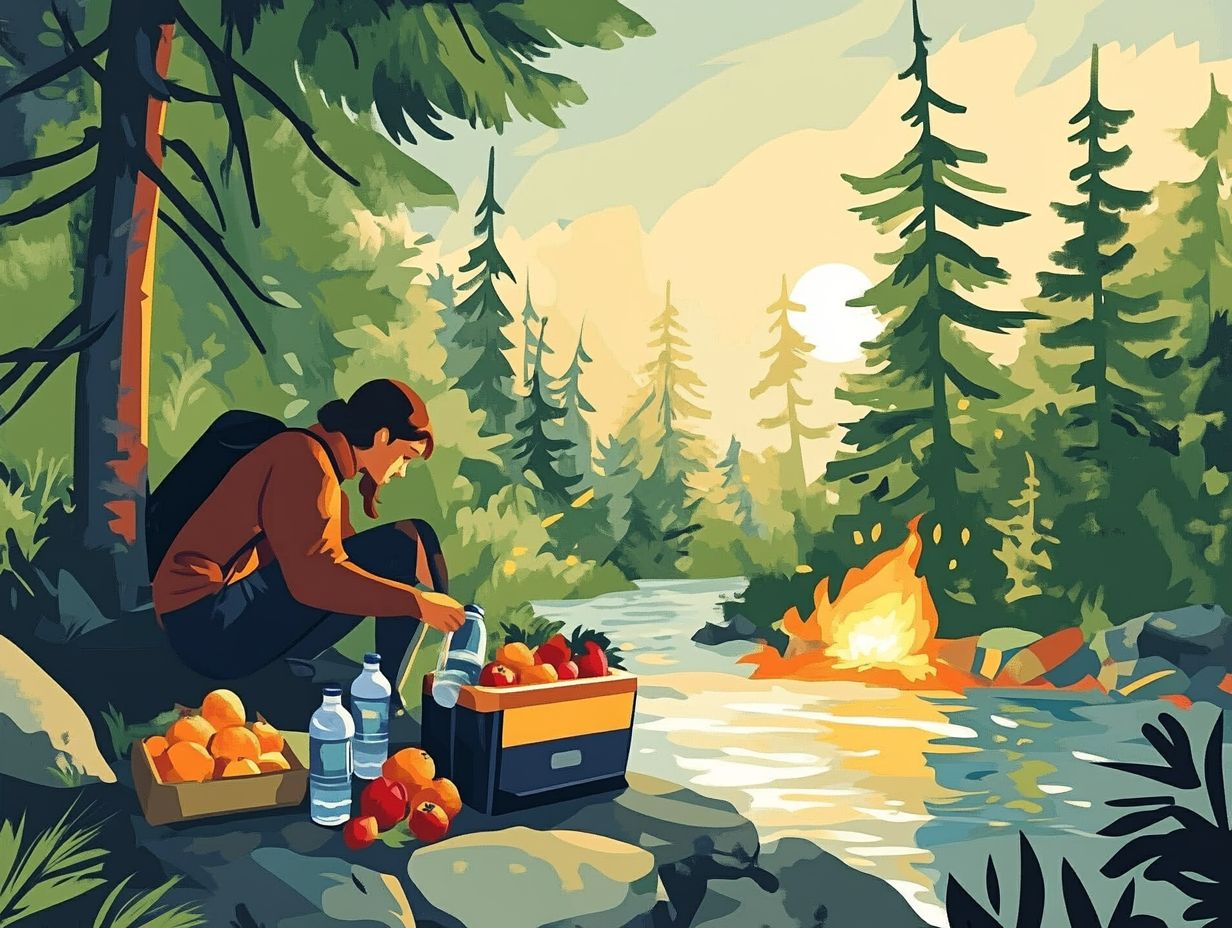
To stay hydrated while camping, drink plenty of water throughout the day. Aim for at least 8-10 cups daily, and increase this if you re physically active or sweating. Bring a reusable water bottle and refill it when you have access to clean water.
What are some tips for staying hydrated in hot weather while camping?
Camping in hot weather can make hydration challenging, but here are some tips. First, choose a campsite with a water source, like a lake or river, to refill your water bottle easily. Second, pack electrolyte-rich drinks or snacks to replenish your body s levels, as sodium and potassium are crucial for hydration. Lastly, avoid sugary or caffeinated drinks, as they can dehydrate you.
Are there any foods that can help me stay hydrated while camping?
Yes, many foods can help you stay hydrated. Fruits and vegetables like watermelon, cucumbers, and celery are high in water content. You can also pack dehydrated fruits and vegetables, which rehydrate easily with water. Additionally, soups and broths are excellent options since they contain both water and electrolytes. However, be cautious of foods that may dehydrate you.
Plan your hydration strategy today to make the most of your next adventure!
What are some signs of dehydration that I should watch out for while camping?
Dehydration can be dangerous. It’s essential to recognize its signs.
Common signs of dehydration include thirst, dark-colored urine, dizziness, fatigue, and dry skin or mouth. If you experience any of these symptoms, take a break and drink some water or fluids that contain minerals to help your body.
How can I make sure I am staying properly hydrated while hiking or doing other physical activities while camping?
If you plan to do physical activities while camping, staying hydrated is crucial. Bring extra water with you and take frequent breaks to drink and refill your bottle.
Packing electrolyte tablets or powder to mix into your water can boost hydration. Plan your activities for the cooler parts of the day and avoid strenuous activities during the hottest hours.
What should I do if I run out of water while camping?
Running out of water while camping can be dangerous. It’s vital to plan ahead and pack enough water for your trip.
If you find yourself running low, look for a water source, such as a stream or lake, and filter or purify the water before drinking it. You can also extract water from natural sources like trees or cacti.
Having emergency water purification tablets, like iodine or chlorine dioxide, or a portable water filter like LifeStraw, is a smart backup plan.

